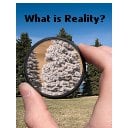wtorek, 31 grudnia 2019
poniedziałek, 30 grudnia 2019
czwartek, 26 grudnia 2019
BlackRock - Die unheimliche Macht eines Finanzkonzerns
BlackRock - Die unheimliche Macht eines Finanzkonzerns
ARTE-Doku: BlackRock – Die unheimliche Macht eines Finanzkonzerns
»Keiner verfügt über mehr Geld als der amerikanische Finanzinvestor BlackRock. Über sechs Billionen Dollar verwaltet der Konzern. Wer über so viel Geld verfügt, hat großen Einfluss. Doch was genau bedeutet das für uns alle? Längst gibt es Experten, die in der unfassbaren Größe von BlackRock eine Bedrohung für den freien Wettbewerb und die Stabilität der Finanzmärkte sehen.«
środa, 25 grudnia 2019
wtorek, 24 grudnia 2019
poniedziałek, 23 grudnia 2019
piątek, 20 grudnia 2019
What Is Reality?
 There is a strange and mysterious world that surrounds us, a world largely hidden from our senses.
There is a strange and mysterious world that surrounds us, a world largely hidden from our senses.The quest to explain the true nature of reality is one of the great scientific detective stories.
Clues have been pieced together from deep within the atom, from the event horizon of black holes, and from the far reaches of the cosmos.
It may be that that we are part of a cosmic hologram, projected from the edge of the universe. Or that we exist in an infinity of parallel worlds. Your reality may never look quite the same again.
https://topdocumentaryfilms.com/what-is-reality/
Fwd: Foreign Policy Parallels Between President Trump and the Ayatollahs
---------- Forwarded message ---------
Od: Jon B. Alterman <middleeastprogram@csis.org>
Date: śr., 18 gru 2019 o 13:32
Subject: Foreign Policy Parallels Between President Trump and the Ayatollahs
To: <ac84703@gmail.com>
Od: Jon B. Alterman <middleeastprogram@csis.org>
Date: śr., 18 gru 2019 o 13:32
Subject: Foreign Policy Parallels Between President Trump and the Ayatollahs
To: <ac84703@gmail.com>
New Middle East Notes and Comment

|
poniedziałek, 16 grudnia 2019
niedziela, 15 grudnia 2019
sobota, 14 grudnia 2019
piątek, 13 grudnia 2019
Creative Quotations from Thomas Wolfe
CREDO
I have never before made a statement of belief [George wrote in his conclusion to Fox], although I have believed in many things and said that I believed in them. But I have never stated my belief in concrete terms because almost every element of my nature has been opposed to the hard framework, the finality, of formulation.
Just as you are the rock of life, I am the web; just as you are Time's granite, so, I think, am I Time's plant....
Just as you are the rock of life, I am the web; just as you are Time's granite, so, I think, am I Time's plant....
Thomas Wolfe
czwartek, 12 grudnia 2019
środa, 11 grudnia 2019
wtorek, 10 grudnia 2019
poniedziałek, 9 grudnia 2019
niedziela, 8 grudnia 2019
sobota, 7 grudnia 2019
piątek, 6 grudnia 2019
środa, 4 grudnia 2019
NATO's not brain dead, but it really needs a strategy
NATO's not brain dead, but it really needs a strategy
Opinion by Heather A. Conley
"NATO's dual political and military tracks are in desperate need of a strategic bridge between them. Simply put, it is time for a 21st century version of the report "The Future Tasks of the Alliance." As we watch the conversation unfold among current NATO leaders 70 years after NATO's founding -- and particularly France's disruptive role -- plus ça change, plus c'est la même chose!"..
wtorek, 3 grudnia 2019
Subskrybuj:
Posty (Atom)







